Accessibility Tools

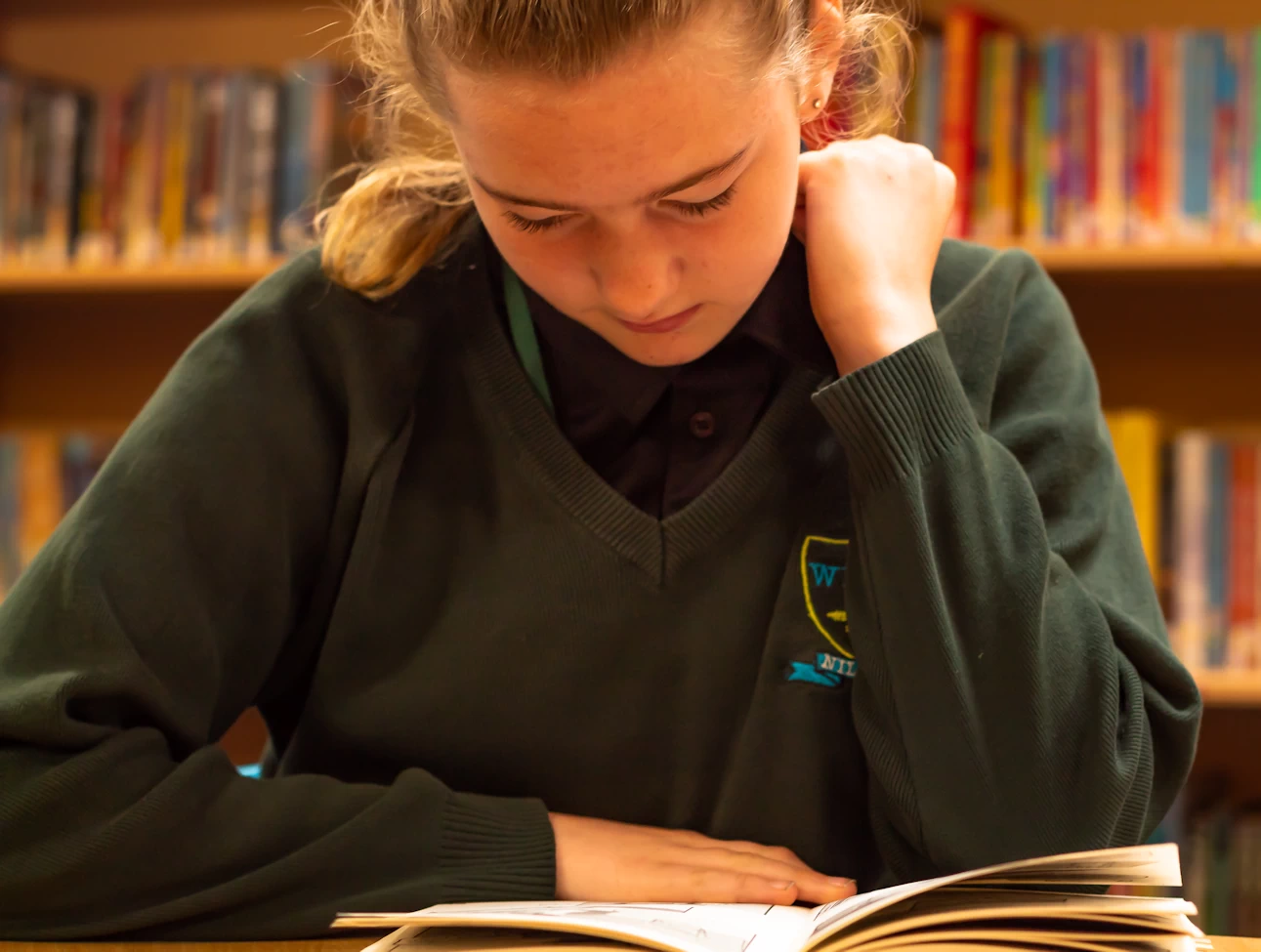
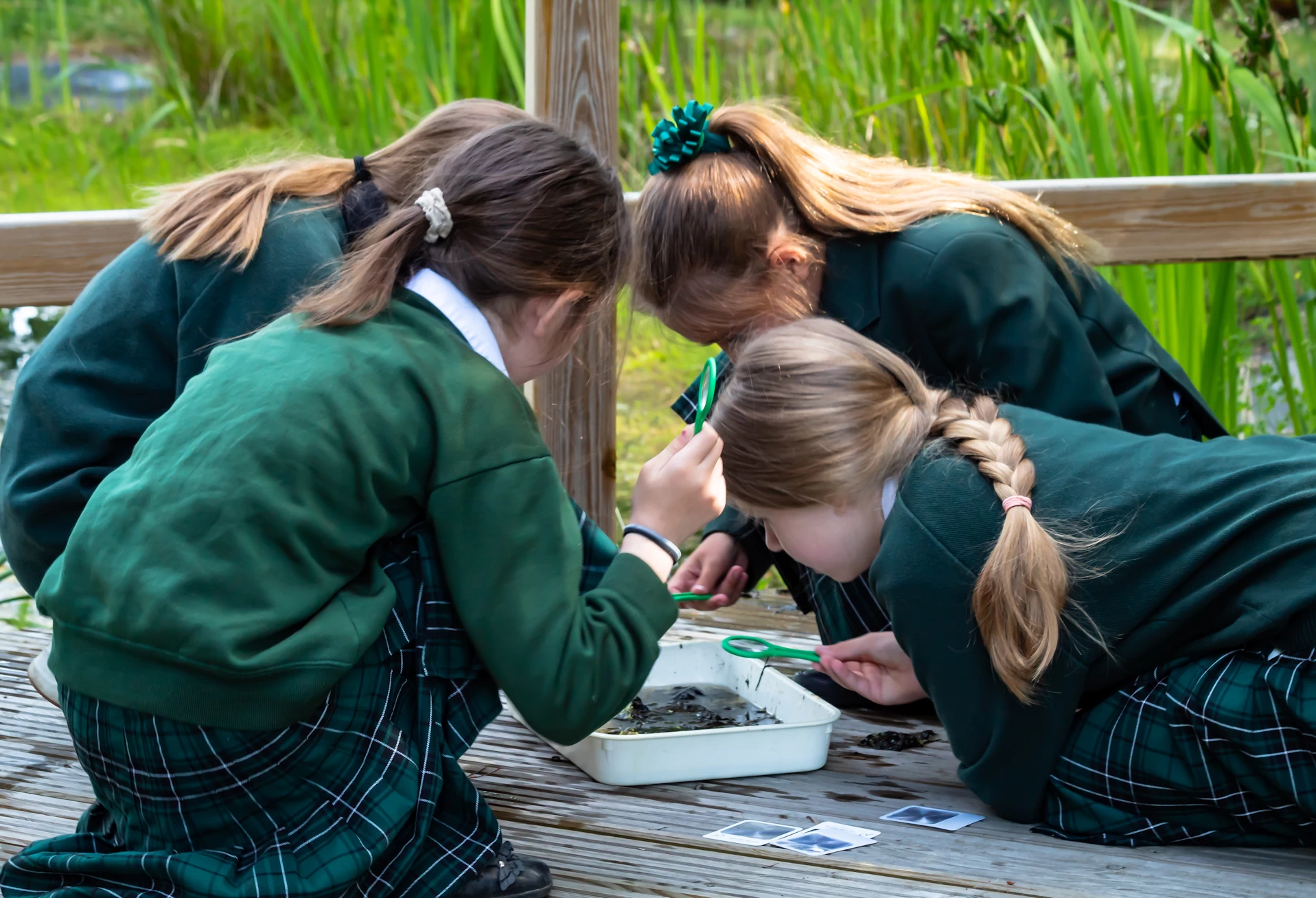
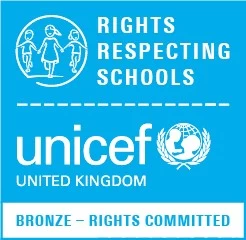 The Rights Respecting School Award (RRSA) is an initiative run by UNICEF UK, which encourages schools to place the UN Convention on the Rights of the Child (CRC) at the heart of its ethos and curriculum.
The Rights Respecting School Award (RRSA) is an initiative run by UNICEF UK, which encourages schools to place the UN Convention on the Rights of the Child (CRC) at the heart of its ethos and curriculum.
The UNCRC enhances pupils’ understanding of the consequences of individual and group actions on the rights of others locally and globally. The articles of the Convention are based on the recognition of every child’s basic needs in order to thrive. The UNCRC therefore sets out a child’s rights to:
On the 20th November 1989 the world made a set of promises for every child on earth. The United Nations Convention on the Rights of the Child is an international statement of all of those promises.
UNICEF protects and promotes those rights and the Rights Respecting Schools Award seeks to put the UN Convention on the Rights of the Child at the heart of a school’s ethos and culture to make sure that every child is healthy, educated, treated fairly and listened to. They also make sure that all children are protected from violence, abuse and exploitation.
The Award recognises achievement in incorporating the Convention into a school’s planning, policies and practice. A Rights Respecting School (RRS) teaches child rights and models rights and respect in all its relationships, both between pupil and adult and adult to pupil.
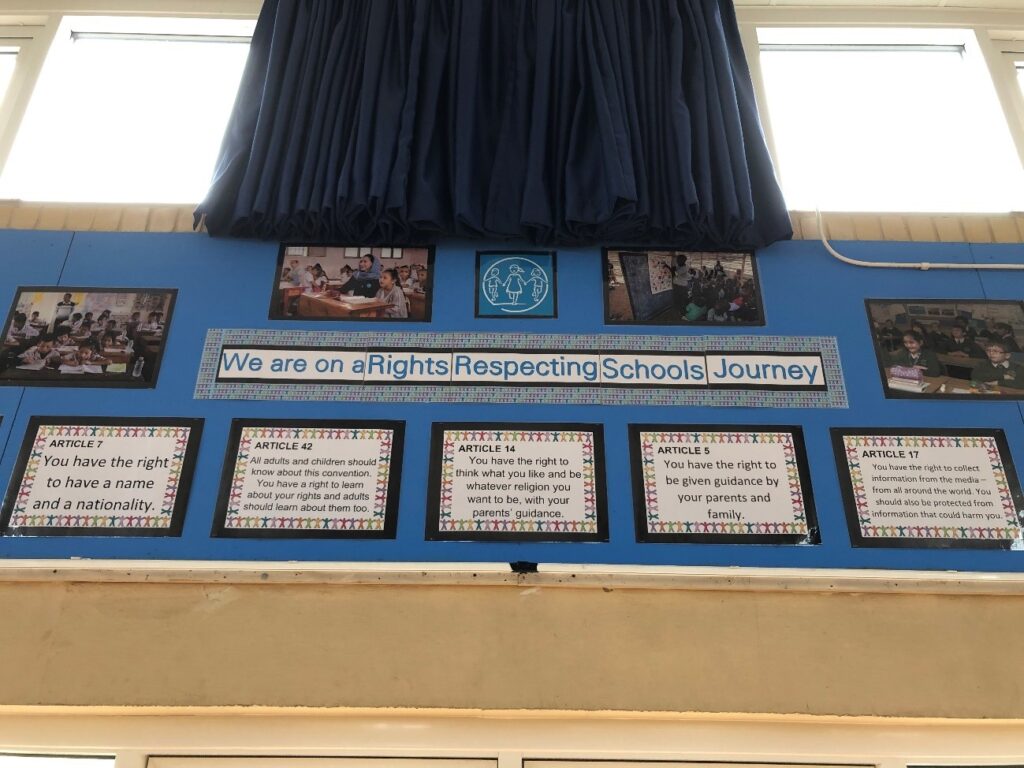
In recognition of our commitment to the rights of every child as set out in the UNICEF Convention on the Rights of Every Child, we will apply for RRSA.
In our school we have a steering group, which consists of two children from each class, who are our Rights Respecting Ambassadors. We also have four adults in our Rights Respecting Working Group who are: Dr Craddock (Head Teacher), Mrs Hilton (Year 6 Tutor and RRS Lead), Miss Middleton (Year 5 Tutor and Eco Lead) and Mrs Cope (Year 7 Tutor and Artsmark Lead). The purpose of the steering groups is to meet up regularly to ensure that as a school, we are doing everything we can to both respect children’s rights and celebrate them.
Here are some posters our children created after we announced our journey on becoming a Rights Respecting school to them:
There are many ways that we learn about the rights in school and virtually, these have been through assemblies, our PSHCE programme: JIGSAW and through our wider curriculum.
We celebrate a Right Respecting Day every year. Each tutor group is allocated an article from the UNCRC to promote. The children develop a class display, which is then taken to the other tutor groups. The Rights Respecting ambassadors tell then other tutor groups about the article they have been exploring as a class.
Year 5 | Year 6 | Year 7 | Year 8 |
5RM | 6JH | 7CC | 8CS |
Article 28 | Article 27 | Article 12 | Article 30 |
Every child has the right to an education. Primary education must be free. Secondary education must be available to every child. Discipline in school must respect Children’s dignity. Richer countries must help poorer countries achieve this | Every child has the right to a standard of living that is good enough to meet their physical social and mental needs. Governments must help families who cannot afford to provide this. | Every child has the right to have a say in all matters affecting them, and the have their views taken seriously. | Every child has the right to learn and use the language, customs and religion of their family, regardless of whether these are shared by the majority of the people in the country where they live. |
5KM | 6CW | 7CS | 8EF |
Article 15 | Article 23 | Article 17 | Article 29 |
Every child has the right to meet with other children and to join groups and organisations, as long as this does not stop other people from enjoying their rights. | A child with a disability has the right to live a full and decent life with dignity and independence, and to play an active part in the community. Governments must do all they can to provide support to disabled children. | Every child has the right to reliable information from the media. This should be information that children can understand. Governments must help protect children fro materials that could harm them. | Education must develop every child’s personality, talents and abilities to the full. It must encourage the child’s respect for human rights, as well as respect for their parents, their own and other r cultures, and the environment. |
Here is some of the work that was produced on the day:
Our children have participated the Mental Health days over the past year.
This year, our mental Health days have centred around dealing with stressful situations and the importance of their voice being heard. The children have been able to discuss topics that are important to them. The children have also had an opportunity to reflect on their mental health to ensure they are looking after it.
The children in each group had different activities the got involved in.
The Outright campaign this year has centred on climate change and how children’s rights are being affected by the changes we are already seeing around the world. The campaign has empowered our children to learn about how climate change threatens children’s rights and how we can protect them.
We started the campaign by taking a quiz across the school, in our tutor groups, to see what the children already knew about climate change.
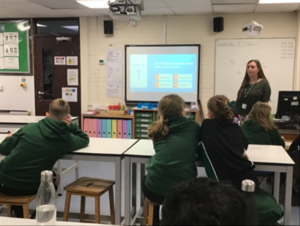
The children then considered how the changes they are seeing affects the rights of children across the world. They also looked at what countries are doing to try to mitigate some of these issues.
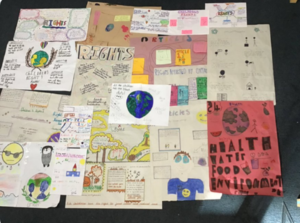
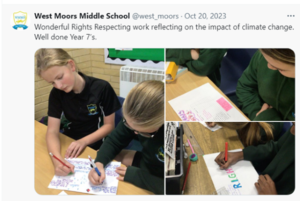
Many of the children were surprised by the effects that are already being seen. As a result, they were empowered to write cards to the Rt. Honourable Graham Stuart (Minister of Sate for Energy Security and Net Zero), in preparation for his meeting at COP28, to highlight their concerns.
On World Children’s day in November, we turned the world blue to highlight the climate change challenge the world is facing.

Recently, the children explored the impact climate change is having on water; from flooding, to its scarcity and to contaminated supplies. This linked in with the Sustainable Development Goals 6, 13 and 14.
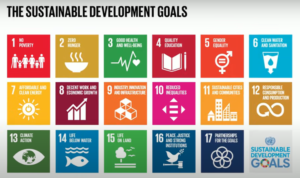
The 2030 Agenda for Sustainable Development, adopted by all United Nations Member States in 2015, provides a shared blueprint for peace and prosperity for people and the planet, now and into the future. At its heart are the 17 Sustainable Development Goals (SDGs), which are an urgent call for action by all countries – developed and developing – in a global partnership. They recognize that ending poverty and other deprivations must go hand-in-hand with strategies that improve health and education, reduce inequality, and spur economic
growth – all while tackling climate change and working to preserve our oceans and forests .
United Nations, Department of Economic and Social Affairs


Useful Links
https://unicef.org.uk/rights-respecting-schools/
What is a Rights Respecting School? https://unicef.org.uk/rights-respecting-schools/the-rrsa/what-is-a-rights-respecting-school/
‘Kahoots!’, which is a global game and online learning platform that teaches about rights through quizzes and online games. https://create.kahoot.it/pages/ef075eb8-7705-4039-970f-72e225b34ad4?_=1571351715
What are the rights? https://unicef.org/child-rights-convention/convention-text-childrens-version